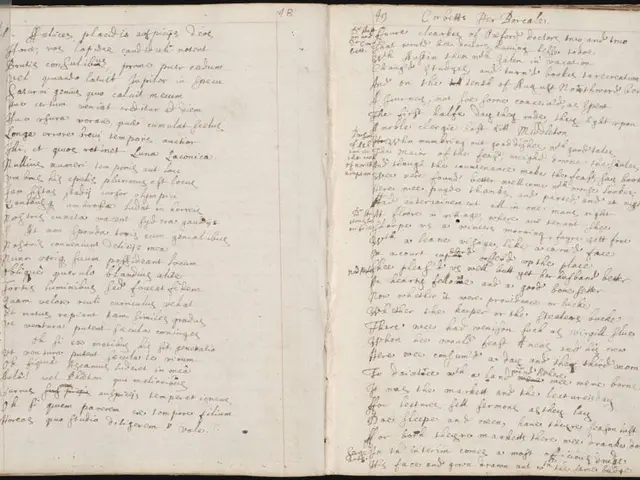Strategies for Crafting a Compelling Personal Statement for Doctoral Programs
Cranking out a top-tier personal statement for your PhD application? Here's the lowdown on crafting a bomber one:
Know Your Purpose
Before you even put pen to paper (or finger to keyboard), grasp the key purpose of your personal statement for a PhD application. It's not just a regurgitation of your academic history—it's your chance to show off your passion for your field, your readiness for hardcore research, and your fit with the program. Unlike undergrad statements, focus more on your research experience, scholarly interests, and long-term aspirations[1][2].
Follow a Procedure
Read the Rules, Stay Organized
- Adhere to prompts and word counts, and keep track of deadlines and requirements for each app[3].
- Stay tidy and avoid forgetting crucial info[3].
Remember Your Key Moments
- Reflect on your academic adventure, research experiences, challenges, and what drives you[1][3].
- Highlight relevant abilities, like particular projects, labs, or coursework that prepared you for advanced study.
Start with a Bang
- Captivate readers with an opening anecdote, intriguing statistic, or compelling statement[4].
- Clearly express why you're fired up about your chosen field.
Organize Your Statement
| Section | What to Cover ||--------------------|-----------------------------------------------------------------|| Introduction | Hook, motivation, and passion for the field || Academic Background | Relevant coursework, research experience, acquired skills || Research Experience | Specific projects, methodologies, results, and learnings || Future Goals | How the PhD will help you reach career or research objectives || Fit with the Program | Why this particular PhD program and faculty are a suitable match |
Exhibit Your Fit
- Identify faculty members whose research aligns with yours and explain why you want to work with them[5].
- Highlight unique resources, facilities, or opportunities the program offers that are relevant to your goals[5].
Tips for Success
- Be Real: Write in your own voice and steer clear of tired clichés.
- Be Specific: Concrete examples are more powerful than vague generalizations[1][3].
- Connect the Past, Present, and Future: Demonstrate how your experiences have prepared you for the PhD and how the program will help you reach your long-term goals[1][5].
Example Layout
By following these steps, you'll craft a winning and captivating personal statement for your PhD application[1][4][5].
Bonus Info (If Needed)
- Take the time to learn more about the program and its researchers so you can tailor your personal statement to the specific department[5].
Our AI writing assistant helps academics write better and faster by offering real-time advice on language, grammar, and style. Trained on millions of research manuscripts revised by professional academic editors, our platform offers human-level precision at machine speed.
Try it for free, or upgrade to our platform Prime, which provides unlimited access to premium features like academic translation, paraphrasing, contextual synonyms, and consistency checks. It's like having a professional academic editor right by your side! Join our platform Prime today for just $12 a month!
References:
- "Writing the Personal Statement" Yale University (n.d.) https://www.yale.edu/graduateschool/admissions/applicantinformation/2019/index.html
- "The Importance of a Personal Statement in Your PhD Application" Prospects (n.d.) https://www.prospects.ac.uk/jobs-careers-advice/articles-tools/applying-postgraduate-courses/important-personal-statement-phd-application
- "How to Write a PhD Personal Statement" Studydaddy (2021) https://www.studydaddy.com/blog/write-phd-personal-statement
- "What Makes a Strong Personal Statement?" The Grad Cafe (n.d.) https://www.thegradcafe.com/forum/phd-personal-statement/
- "How to Write a Competitive PhD Personal Statement: A Guide for Applicants" The Conversation (2020) https://theconversation.com/how-to-write-a-competitive-phd-personal-statement-a-guide-for-applicants-131969
Keywords:
- PhD application
- personal statement
- professional writing
- academic writing tips
- writing for application
- writing advice for PhD
- writing a strong personal statement
- how to write a winning personal statement
- compose personal statement
- tips for creating personal statement
- To enrich your academic translation skills, consider using a platform that offers real-time suggestions and paraphrasing tools, helping you articulate your ideas more effectively for education-and-self-development purposes.
- In the process of academic writing, ensure consistency checks are performed to maintain a coherent narrative, thus contributing to the overall quality of your research paper.
- For those seeking personal-growth opportunities, our AI writing assistant offers support in crafting academic papers alongside contextual synonyms, academic translation, and paraphrasing services, making the writing process smoother and more efficient.
- In the quest for learning and mastering the art of writing a research paper, spare some time to reflect on influential research papers and academic writing samples to explore new ideas and gathering inspiration.





